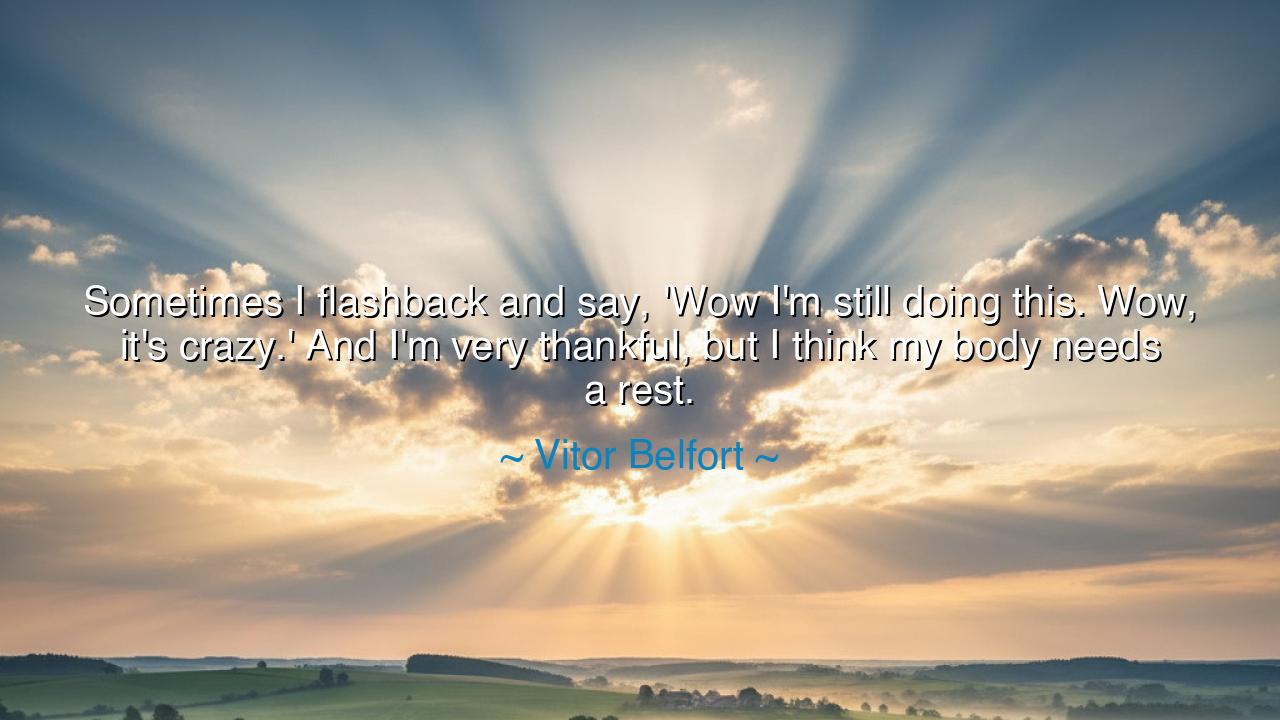
Sometimes I flashback and say, 'Wow I'm still doing this. Wow
Sometimes I flashback and say, 'Wow I'm still doing this. Wow, it's crazy.' And I'm very thankful, but I think my body needs a rest.






Hear now the words of Vitor Belfort, a warrior of the cage who has fought long battles and endured the trials of body and spirit: “Sometimes I flashback and say, ‘Wow I’m still doing this. Wow, it’s crazy.’ And I’m very thankful, but I think my body needs a rest.” In this utterance, there is both triumph and humility, both gratitude and weariness. His words are not only for fighters, but for all who struggle, for all who carry the weight of years and yet remain steadfast in their calling.
The first flame in his speech is the marvel of endurance. “Wow, I’m still doing this,” he says, as though astonished by his own persistence. Many begin the journey, but few remain after storms, defeats, and the slow erosion of time. Belfort reminds us that to endure is itself a victory. The fact of continuing—when the body aches and the years press heavy—is cause for awe. Endurance, though often overlooked, is the crown of the steadfast.
The second jewel is thankfulness. Though astonished at his own longevity, Belfort does not boast. Instead, he bows in gratitude. Gratitude that his body still carried him, gratitude for the stages he fought upon, gratitude for the chance to live his passion. This humility is the mark of greatness, for true champions know that their strength is not theirs alone but shaped by training, sacrifice, mentors, and divine grace. To be thankful even in exhaustion is to remember that life itself is the greatest prize.
Yet within his words also lies the confession of weariness: “my body needs a rest.” Here we find the wisdom of balance. Too often, men and women chase endlessly after glory, blind to the toll it takes upon their flesh and spirit. But Belfort, though a warrior, acknowledges the limit of his frame. This is not weakness but wisdom—the recognition that rest is as holy as battle, and that the body, if neglected, will betray the will. Even the strongest must bow to the law of renewal.
History gives us a mirror in the life of Alexander the Great. He conquered nations, stretched his empire from Greece to India, and marveled at his own persistence. Yet in his relentless striving, he refused his body rest, driving himself into sickness and early death. His name became legend, yet his life was cut short by the absence of balance. Belfort’s words stand as a counter-teaching: to endure long, one must honor both the call to battle and the call to rest.
The lesson for us is clear: marvel at your endurance, give thanks for your journey, but also honor your limits. Do not despise rest, for it is the fountain from which new strength flows. Every warrior must sheath his sword at times; every laborer must set down his tools; every dreamer must sleep to dream anew. Gratitude and rest together preserve the spirit so that the journey may continue.
Practically, take time to reflect on your own endurance. Say to yourself, as Belfort did: “Wow, I’m still doing this.” Let that truth awaken your gratitude, not pride. Then ask honestly: Does my body, does my soul, need rest? Do not wait for collapse to force you into stillness. Build rhythms of renewal into your life—moments of Sabbath, pauses of reflection, days of healing. Rest is not retreat; it is preparation for the battles ahead.
Thus the words of Vitor Belfort echo as a teaching for the generations: be thankful for your endurance, honor your body’s limits, and embrace rest as part of the warrior’s path. For only through this balance can a life be lived not merely with strength, but with wisdom, humility, and longevity. And in such a life, both the victories and the pauses become sacred offerings.






AAdministratorAdministrator
Welcome, honored guests. Please leave a comment, we will respond soon